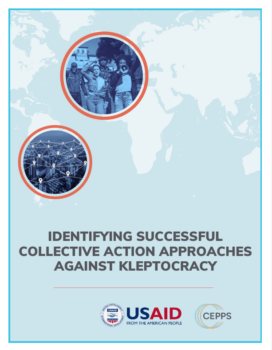To read this issue in its original format, click here.
Dear Colleagues,
The “Year of Elections, 2024,” was the biggest election year in human history. More than 60 countries held national elections which engaged as many as 1.5 billion eligible voters.
As we come to the end of the year, the Consortium for Elections and Political Process Strengthening (CEPPS) and our core partners, the International Foundation for Electoral Systems (IFES), the International Republican Institute (IRI) and the National Democratic Institute (NDI), would like to highlight the impact of monitoring, evaluating and learning (MEL) on our democracy, rights and governance (DRG) programming. Collecting information from our programming means partners have the appropriate details and insights to design and implement effective programs that bolster inclusive democratic systems and respond effectively to a wide range of people where we work.
In 2025, CEPPS with support from the United States Agency for International Development (USAID), under the Democratic Elections and Political Processes (DEPP) cooperative agreement, will continue to apply the latest in research and evaluation to ensure our programming empowers our local and regional partners while sharing information with the greater DRG community.
As 2024 concludes, we thank our partners around the world for their tireless devotion to democracy and our shared mission.
Sincerely,
The CEPPS Team
CEPPS Launches a Series of New Technical Leadership and Pilot Projects
CEPPS partners are excited to announce the launch of six new research projects funded by the DEPP award. These efforts are designed to advance democratic resilience and electoral integrity by addressing key questions the consortium’s members seek to answer through the DEPP Learning Agenda.
Each project focuses on effective strategies that actors in a democratic system can apply to bolster pro-democratic norms and resilience. For example, one project focuses on strategies that pro-democracy parties can use to overcome entrenched political regimes in order to allow new, smaller parties to enter the political discourse through coalition building.
Another example of ongoing CEPPS research examines the use of strategic litigation to promote and maintain people’s right to free and fair electoral processes worldwide.
Additional projects will explore how civil society organizations (CSOs) and activists can push back when government restrictions limit freedom of speech and how CSOs can leverage data to identify effective and cost-efficient strategies that ensure all citizens can meaningfully participate in political processes.
For more on CEPPS’s upcoming publications, follow us on social media.
Gender equity and social inclusion (GESI) are essential elements when designing and implementing inclusive programs that adequately respond to the needs of diverse members of the societies in which we work. CEPPS’s Inclusive Monitoring, Evaluation, and Learning (IMEL) approach is grounded in principles of inclusion and accountability, created to ensure that CEPPS partners have the data and insights necessary to design, monitor, and adapt programming that bolsters inclusive and accountable democratic systems.
To support the implementation of GESI programming, CEPPS developed a suite of IMEL tools which focus on how to effectively integrate gender and social inclusion considerations into MEL efforts. These tools help unlock insights into gender-based violence, women’s and youth political participation, and more. CEPPS partners have leveraged these resources in more than a dozen programs to inform activity design and assess program performance.

The rise of kleptocracy is a threat to democracy and a contributing factor to the ongoing democratic recession that negatively affects the lives and livelihoods of millions of people around the world. However, throughout the world, there are examples of citizens, civil society, and others strategically collaborating to thwart kleptocratic governance or create a window of opportunity for meaningful anti-corruption and pro-democracy reform.
In this latest report from the consortium, we take a close look at seven examples of collective action against kleptocracy to better understand how civil society can contribute to sustainable change.

Final Report: Identifying Successful Collective Action Approaches Against Kleptocracy
Executive Summary: Identifying Successful Action Approaches Against Kleptocracy
Video Series: Identifying Successful Collective Action Approaches Against Kleptocracy
Podcast Series: Collectively Combatting Kleptocracy
About the DEPP Learning Agenda
In Moldova, CEPPS core partners IFES, IRI and NDI support women’s advancement and leadership with help from USAID. These trainings foster a sense of community and provide valuable networking opportunities for female politicians, helping meet Moldova’s gender quota and ensure that all voices are heard.
“Before the program, I was hesitant to speak up in meetings. The training helped me develop my voice and feel more confident sharing my ideas.” – a female party leader in Moldova
CEPPS recently concluded a mid-term evaluation of its Moldova Inclusive and Participatory Political Processes program, highlighting important advancements in women’s political participation.

At the American Evaluation Association (#Eval24) conference in October, CEPPS core partners presented their work to advance democracy by building MEL systems that promote inclusion and accountability. IFES, IRI, and NDI presenters highlighted the value of having a guiding, global theory of change and the DEPP Learning Agenda to strengthen the evidence about what works to support democratic resilience worldwide. The presentation also featured the collaboration among CEPPS partners to develop streamlined approaches to evaluation and collaborating, learning, and adapting (CLA), which have contributed to improving inclusive and accountable MEL at the program level. CEPPS partners shared their successes strengthening broad participation in CLA sessions in Bangladesh, implementing participatory evaluation approaches in Ethiopia, and integrating local partners into monitoring, evaluation, and learning systems in Kenya.
To learn more about CEPPS inclusive and accountable MEL approach, visit the website.
In each issue of Beyond the Ballot, “Democracy by the Numbers” features data gathered from CEPPS’s indicator database. This information comes from the rigorous reporting and analysis by MEL teams across the CEPPS partners and ensures that DRG programming reaches its targeted audience. With support from USAID during this “year of elections,” CEPPS partners were promoting electoral integrity around the world.

For more on CEPPS programming, check out CEPPS.org.


